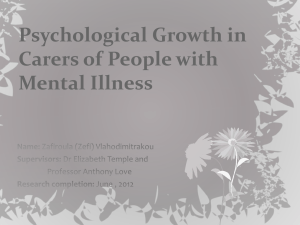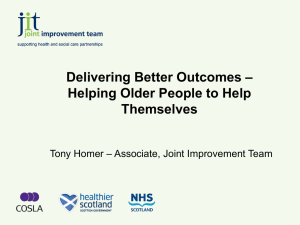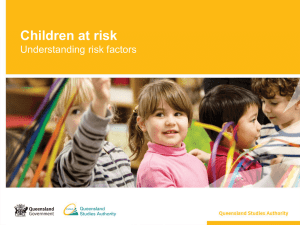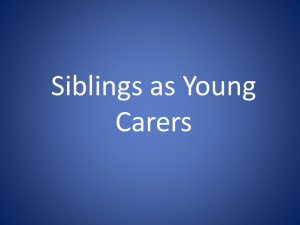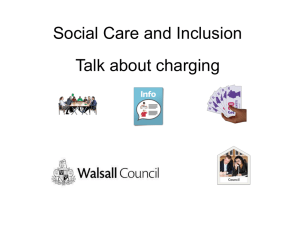this presentation (Powerpoint presentation 142kb)
advertisement
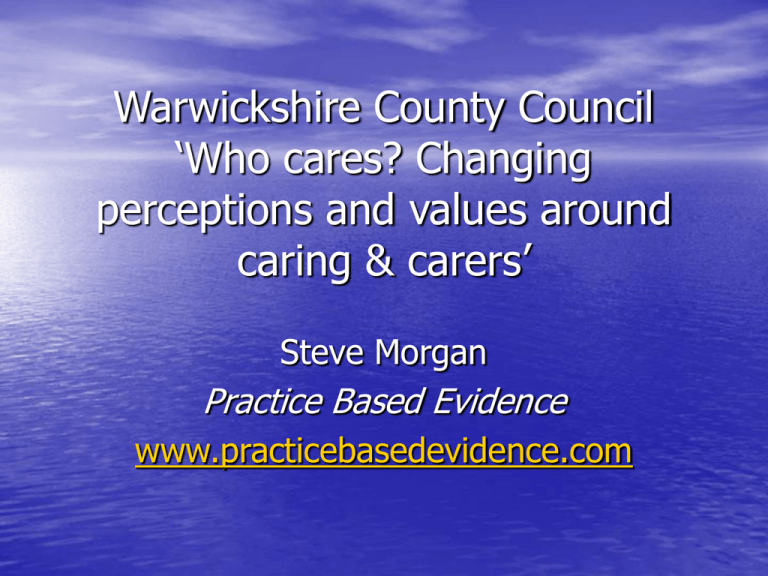
Warwickshire County Council ‘Who cares? Changing perceptions and values around caring & carers’ Steve Morgan Practice Based Evidence www.practicebasedevidence.com Carers Strategy (HM Govt 2008) • 1 in 10 people in the UK are carers at any one • • • • time (more women than men) In 2001 census 5.2 million carers (>20% caring for more than 20 hours/week) 1 in 7 of the workforce are carers (3 million) 40% of carers of working age would like to work now or at some time in their lives 139,000 under 18’s provide some care (16% more than 20 hours/week, some > 50 hours) Steve Morgan ~ www.practicebasedevidence.com Warwickshire Carers Strategy 2009 - 2012 • 53,221 carers (10.2% population) in 2001 • • • census… compared with 10% nationally Nuneaton & Bedworth district has a higher than national proportion of those people providing >50 hours/week 1220 young carers across the county (56% in lone parent families) Approximately 20% of young carers are providing >20 hours/week in caring role Steve Morgan ~ www.practicebasedevidence.com What do many carers want? • “The majority of us carers are not just whingeing at services, we want the best for our loved ones.” (Risk workshops) • “Don’t lump us all together as the same, we have our own personal needs, as do the people we care for.” (Risk workshops) Steve Morgan ~ www.practicebasedevidence.com What about helping me take a break? • “If you are a carer you give up opportunities non-carers take for granted.” (Govt consultation event) • “Life as a carer becomes increasingly synonymous with the person you care for, limiting opportunities for a life outside of the caring role.” (Govt consultation event) Steve Morgan ~ www.practicebasedevidence.com How am I meant to cope financially? • “The carers allowance doesn’t reflect the work that goes into caring.” (Govt consultation event) • “I am not even sure if I, and the person I care for, are even claiming everything we are entitled to.” (Govt consultation event) Steve Morgan ~ www.practicebasedevidence.com What about my health? • Your health is postponed if you are a carer.” • • (Govt consultation event) “All carers need a carer to cope with the emotional strain you’re put under.” (Govt consultation event) Health professionals don’t recognise depression in carers. We get pigeon-holed and marginalised rather than helped to cope.” (Govt consultation event) Steve Morgan ~ www.practicebasedevidence.com What about my feelings? • “As a carer I often feel guilty; did I do • • something to cause the illness and disability?” (Risk workshops) I keep telling them when something is going wrong, but they never listen to me.” (Risk workshops) “I am left feeling like I am the obstacle, but nobody includes me in making the plans.” (Risk workshops) Steve Morgan ~ www.practicebasedevidence.com What about attitudes in work? • “Employers need to be made aware that carers are very committed people who take work seriously, otherwise they would not take their responsibilities as carers seriously.” (Govt consultation event) Steve Morgan ~ www.practicebasedevidence.com What about ‘young’ carers? • “If we miss out on opportunities we feel we miss • • • out on some childhood.” (Govt consultation event) “I shouldn’t have to choose between my family and my future.” (Govt consultation event) “I have a lack of time to learn, socialise and use opportunities to do what young people do.” (Govt consultation event) “GPs, school and other front-line workers do not understand what I need.” (Govt consultation event) Steve Morgan ~ www.practicebasedevidence.com Defining carers (HM Govt) • A carer spends a significant proportion of their • • life providing unpaid support to family or potentially friends This could be caring for a relative, partner or friend who is ill, frail, disabled or has mental health or substance misuse problems The experience will differ according to personal circumstances, cultural expectations and family structures within different communities Steve Morgan ~ www.practicebasedevidence.com Identifying carers • Not a homogenous group • People from all walks of life, and stages in their • • lives… potentially every one of us For some groups little is known, because of the difficulty identifying them (e.g. Learning Disability, LGBT) A number of people do not identify themselves as being in a caring role (e.g. cultural factors, defined by familial relationships, entitlements) Steve Morgan ~ www.practicebasedevidence.com
